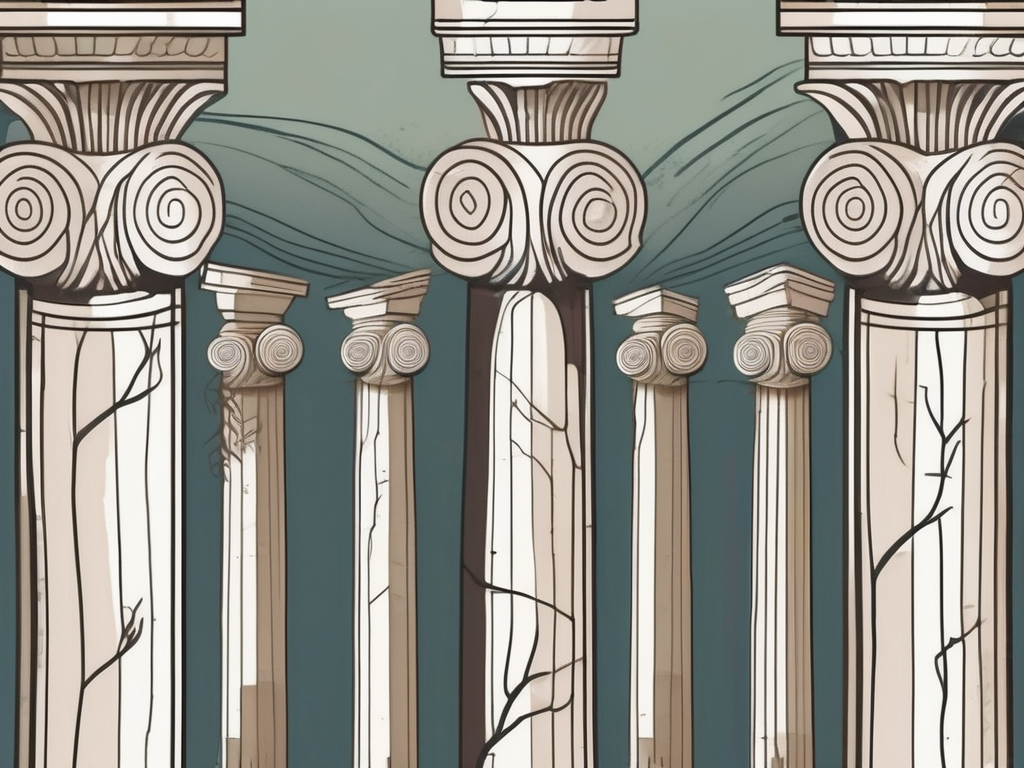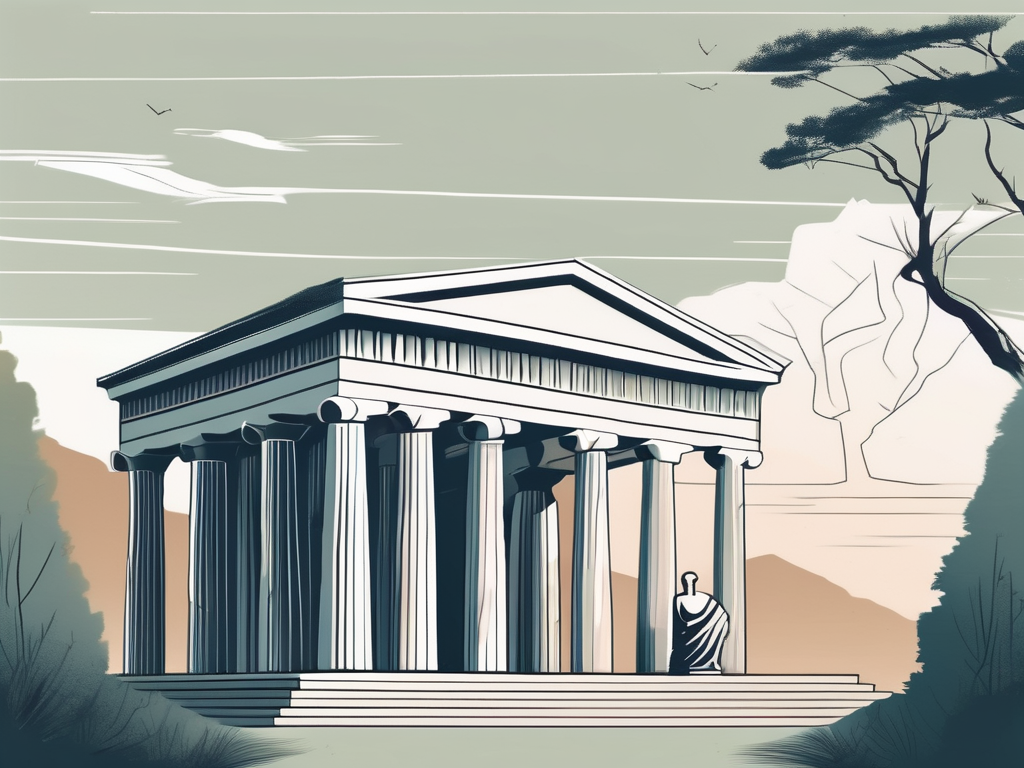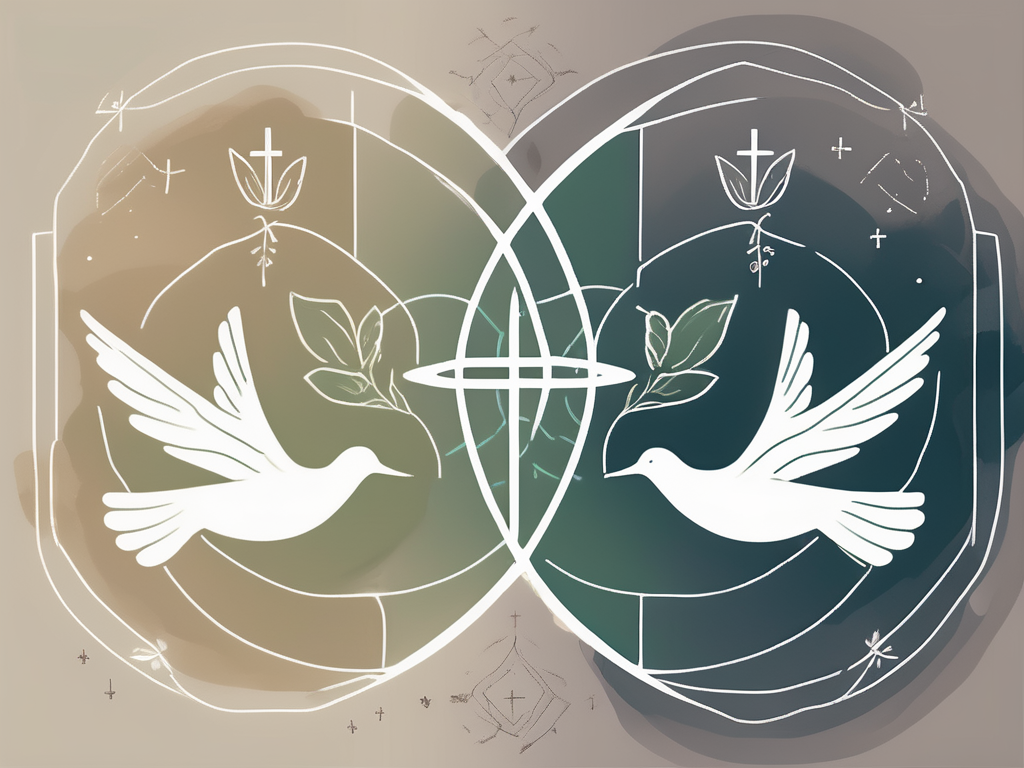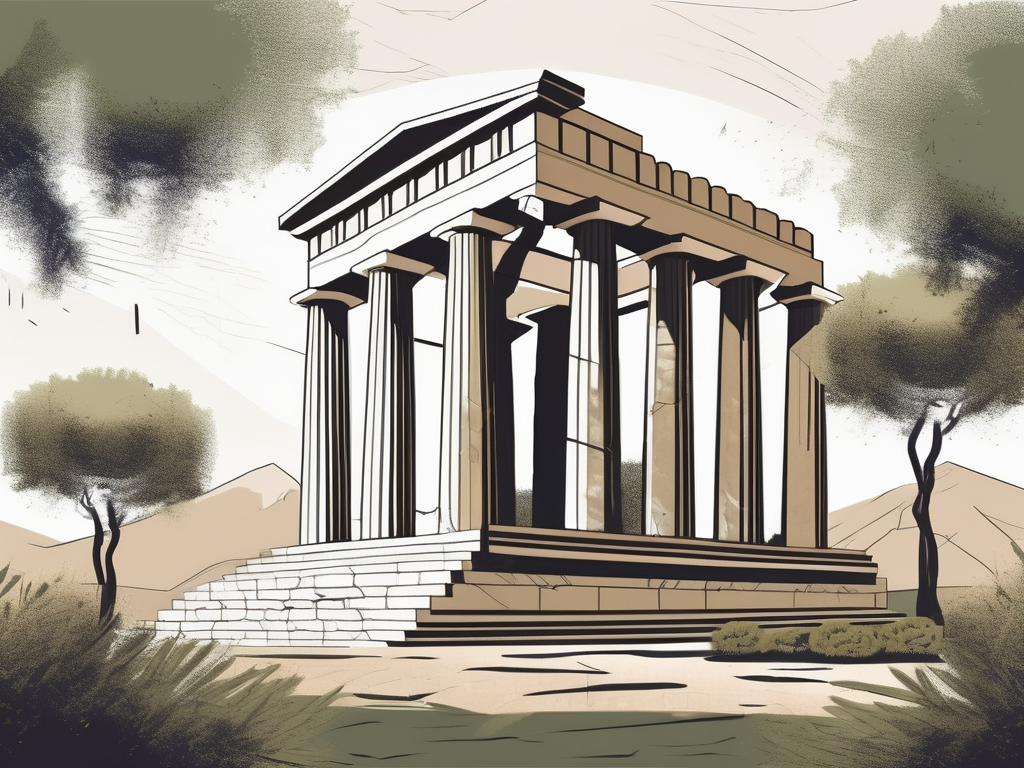Stoicism and Catholicism may seem like two vastly different belief systems at first glance, but upon closer examination, you’ll discover intriguing parallels that highlight a shared pursuit of wisdom, virtue, and spiritual fulfillment. This article delves into the core principles of Stoicism and Catholicism, explores their philosophical overlap, examines the spiritual practices associated with each, and investigates the influence Stoicism has had on Catholic thought.
Understanding Stoicism: A Brief Overview
Stoicism, derived from the Greek word “stoa,” meaning porch, originated in Athens around 300 BCE. The Stoics viewed philosophy as a practical guide to living a good life. At its core, Stoicism emphasizes the development of inner peace and virtue through the acceptance of one’s circumstances and the practice of self-control.
The stoic philosophy teaches that the path to happiness lies not in acquiring material possessions or external circumstances but within oneself. By focusing on what we can control – our thoughts, attitudes, and actions – Stoicism encourages individuals to cultivate strength and resilience.
But what does it mean to cultivate strength and resilience? Stoicism teaches us that it is about recognizing the power of our own minds. It is about understanding that we have the ability to choose how we respond to any given situation. This recognition empowers us to find peace and contentment, regardless of the external circumstances that may be beyond our control.
Stoicism invites us to embrace the concept of the Dichotomy of Control. This principle encourages us to distinguish between what is within our control and what is not. By doing so, we can focus our efforts on what truly matters and let go of the things that are beyond our influence. This distinction allows us to channel our energy towards personal growth and the pursuit of virtue.
The Core Principles of Stoicism
Stoicism is built upon a set of fundamental principles that serve as guiding tenets for leading a virtuous life. These include:
- The Dichotomy of Control: Distinguishing between what is within our control and what is not, allowing us to focus our efforts on what truly matters.
- Virtue as the Highest Good: Recognizing that living a virtuous life, characterized by wisdom, courage, justice, and temperance, is the ultimate source of fulfillment.
- Living in Accordance with Nature: Aligning our desires and actions with the natural order of the universe, accepting and embracing the inevitability of change.
- Amor Fati: Embracing and loving our fate, understanding that everything that happens is part of a larger plan and an opportunity for growth.
These principles provide a framework for navigating life’s challenges and finding meaning in our experiences. They encourage us to prioritize personal growth, moral integrity, and the pursuit of wisdom.
Living in accordance with nature, as Stoicism suggests, does not mean rejecting modern society or isolating oneself from the world. Rather, it is about aligning our desires and actions with the natural order of things. It is about recognizing that change is inevitable and embracing it with open arms. By doing so, we can find harmony within ourselves and the world around us.
Stoicism’s Influence on Western Philosophy
Stoicism has left an indelible mark on Western philosophy, profoundly shaping the thoughts and teachings of distinguished philosophers throughout history. Its influence can be seen in the works of Seneca, Epictetus, and the Roman Emperor Marcus Aurelius.
Seneca, a prominent Stoic philosopher, emphasized the importance of self-discipline and the pursuit of virtue. He believed that true happiness could only be achieved through the cultivation of moral integrity and the practice of self-control. His writings on Stoicism continue to inspire and guide individuals seeking a meaningful and fulfilling life.
Epictetus, another notable Stoic philosopher, focused on the power of our thoughts and attitudes. He believed that our perception of events, rather than the events themselves, determines our emotional well-being. Epictetus taught that by cultivating a mindset of gratitude and acceptance, we can find peace and tranquility in any circumstance.
Marcus Aurelius, the Roman Emperor and Stoic philosopher, exemplified the principles of Stoicism in his daily life. His book, “Meditations,” serves as a testament to his commitment to virtue and self-improvement. In it, he reflects on the importance of moral integrity, the transience of life, and the acceptance of adversity.
Stoic principles, such as the importance of self-discipline, the pursuit of virtue, and the acceptance of adversity, resonate with many philosophical and ethical traditions that followed, including Christianity. The Stoic emphasis on personal responsibility, resilience, and the pursuit of inner peace continues to inspire individuals seeking guidance in navigating life’s challenges.
So, whether you are seeking a practical philosophy for daily living or a deeper understanding of the human experience, Stoicism offers valuable insights and timeless wisdom. It invites us to embrace the power of our own minds, cultivate moral integrity, and find contentment within ourselves, regardless of the circumstances we may face.
An Introduction to Catholicism
Catholicism, one of the oldest and most widespread Christian denominations, traces its origins to the teachings of Jesus Christ and the apostles. Catholicism encompasses a rich tapestry of beliefs, rituals, and traditions that guide the lives of millions across the globe.
The history of Catholicism is intertwined with the history of Christianity itself. It emerged as a distinct faith tradition in the early centuries of the Common Era, as followers of Jesus sought to preserve and pass on his teachings. The word “Catholic” comes from the Greek word “katholikos,” meaning “universal,” reflecting the Church’s mission to spread the Gospel to all people.
The Fundamental Beliefs of Catholicism
Catholicism revolves around core tenets that form the bedrock of the faith. These include:
- The Holy Trinity: Belief in the Father, Son, and Holy Spirit as three distinct persons in one God.
- The Incarnation: The belief that Jesus, the Son of God, became flesh and dwelt among humanity to save them from sin.
- The Sacraments: Special rituals, such as baptism and the Eucharist, through which believers receive divine grace.
- The Communion of Saints: The spiritual connection between all believers, both living and deceased, fostering a sense of community and support.
The concept of the Holy Trinity is central to Catholic theology. It reflects the belief in the divine nature of Jesus Christ and the presence of the Holy Spirit in the lives of believers. This understanding of God as a Trinity of persons is a mystery that Catholics contemplate and seek to understand throughout their spiritual journey.
The Incarnation is a profound and foundational belief in Catholicism. It emphasizes the divine nature of Jesus and his role as the Savior of humanity. Through his life, death, and resurrection, Jesus offers redemption and the promise of eternal life to all who believe in him.
The sacraments are sacred rituals that Catholics believe confer the grace of God upon the participants. Baptism, for example, is seen as the initiation into the Christian community and the forgiveness of original sin. The Eucharist, also known as Holy Communion, is a central sacrament in which Catholics believe they receive the body and blood of Christ.
The Communion of Saints is a unique aspect of Catholic belief. It emphasizes the interconnectedness of all believers, whether they are on earth or in heaven. Catholics believe that the saints, who have lived holy lives and are now in the presence of God, can intercede on behalf of the living and offer guidance and support.
The Role of Catholicism in Shaping Societies
Catholicism has played a significant role in shaping the moral, social, and cultural fabric of societies throughout history. From influencing education and healthcare systems to driving humanitarian efforts, the Catholic Church’s teachings have left an indelible mark on countless lives.
The principles of Catholic social teaching, which emphasize human dignity, solidarity, and the common good, align closely with Stoic ideals of justice and compassion. Throughout the centuries, Catholic institutions have been at the forefront of providing education and healthcare to those in need. Monastic orders, such as the Benedictines and Franciscans, have established schools, hospitals, and orphanages, contributing to the development of society and the well-being of individuals.
Moreover, the Catholic Church has been a strong advocate for social justice and human rights. From the abolition of slavery to the promotion of workers’ rights, the Church has consistently spoken out against injustice and worked towards creating a more equitable society. Catholic social teaching continues to inspire individuals and organizations to address issues such as poverty, inequality, and environmental stewardship.
Furthermore, Catholicism has influenced art, architecture, and literature throughout history. From the grandeur of cathedrals to the masterpieces of Renaissance painters, the Catholic Church has been a patron of the arts, using them to express and communicate its beliefs and values. The works of Dante, Michelangelo, and Caravaggio, among others, continue to captivate and inspire people today.
In conclusion, Catholicism is a rich and multifaceted faith tradition that encompasses not only religious beliefs but also a commitment to social justice, education, and the arts. Its teachings and practices continue to shape the lives of millions of individuals and have a lasting impact on societies around the world.
The Philosophical Overlap: Stoicism and Catholicism
While Stoicism and Catholicism emerged from different historical and cultural contexts, they share several ethical perspectives and teachings that bridge the gap between them.
Shared Ethical Perspectives
Both Stoicism and Catholicism emphasize the importance of moral virtues such as justice, courage, and temperance. They encourage individuals to cultivate these virtues to lead a virtuous and meaningful life.
Furthermore, both traditions stress the significance of personal responsibility and the need to contribute positively to society. They highlight the importance of selflessness, generosity, and compassion in our relationships with others.
Common Themes in Stoic and Catholic Teachings
Stoicism and Catholicism converge on various philosophical themes that center on the human experience and our relationship with the divine. Both traditions recognize the impermanence of worldly possessions and advocate for detachment from material desires.
Additionally, both Stoicism and Catholicism acknowledge the necessity of radical acceptance of life’s challenges and setbacks. They teach that finding solace and strength through faith, coupled with the practice of resilience, can transform adversity into an opportunity for spiritual growth.
Spiritual Practices in Stoicism and Catholicism
Beyond their shared ethical principles, Stoicism and Catholicism embrace distinct spiritual practices that enable their adherents to deepen their understanding and connection with the divine.
Stoic Practices for Inner Peace
Stoicism offers various practical exercises aimed at cultivating inner peace and self-mastery. These include meditation, journaling, and reflection on one’s own mortality.
Meditation allows individuals to observe their thoughts and emotions impartially, fostering a sense of detachment and tranquility. Journaling provides a platform for self-reflection and the examination of one’s values and actions. Reflecting on mortality reminds us of the brevity of life, prompting us to prioritize what truly matters.
Catholic Rituals and Their Significance
Catholicism embraces a rich tapestry of rituals and sacraments that heighten believers’ connection to God and foster spiritual growth. These rituals, such as the Holy Mass, confession, and prayer, serve as essential conduits for divine grace.
The Holy Mass, the central act of Catholic worship, offers believers an opportunity to encounter Christ’s presence through the ritual of the Eucharist. Confession allows individuals to seek forgiveness for their sins and receive spiritual healing, while prayer facilitates communication with God and nurturing a personal relationship with the divine.
The Influence of Stoicism on Catholic Thought
Stoicism’s enduring philosophical legacy can be detected in various aspects of Catholic theology, enriching and shaping the Church’s understanding of the human experience and our relationship with God.
Stoic Elements in Catholic Theology
The Stoic concept of “Logos,” the divine reason that governs the universe, finds resonance in Catholic theology through the belief in the Word of God made flesh in Jesus Christ.
Furthermore, Stoic ideas around the proper use of reason and the importance of virtue inform Catholic moral theology, providing a framework for understanding the nature of sin and the pursuit of a moral life.
Stoic Philosophers and Their Impact on Catholicism
Stoic philosophers, such as Seneca and Marcus Aurelius, have left an indelible mark on Catholic thinkers throughout history. Their writings have influenced prominent Catholic theologians, including St. Augustine and St. Thomas Aquinas.
These philosophical giants’ ideas on the nature of virtue, the human condition, and the pursuit of truth have guided Catholic intellectuals’ exploration of theological and philosophical questions.
In conclusion, the intersection of Stoicism and Catholicism uncovers intriguing connections between two seemingly distinct belief systems. By exploring their shared philosophies and spiritual practices, we gain insights into the universal quest for inner peace, virtue, and spiritual fulfillment. Whether it’s through Stoicism’s emphasis on self-control and acceptance or Catholicism’s rich tapestry of rituals and sacraments, both traditions offer valuable guidance on living a meaningful and purposeful life.












